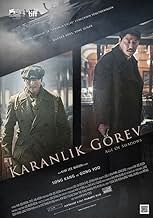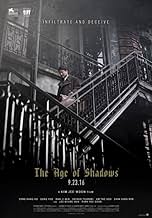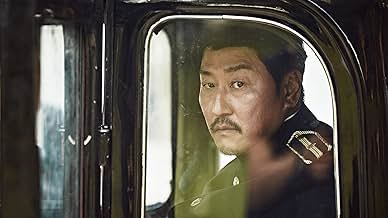VALUTAZIONE IMDb
7,1/10
11.697
LA TUA VALUTAZIONE
I combattenti della resistenza coreani contrabbandano esplosivi per distruggere le strutture controllate dalle forze giapponesi.I combattenti della resistenza coreani contrabbandano esplosivi per distruggere le strutture controllate dalle forze giapponesi.I combattenti della resistenza coreani contrabbandano esplosivi per distruggere le strutture controllate dalle forze giapponesi.
- Regia
- Sceneggiatura
- Star
- Premi
- 16 vittorie e 41 candidature totali
Recensioni in evidenza
Based on the real story that happened during the time that Japan ruled the Korea, The Age of Shadow is very successful history-based movie. It is a fine mixture of Korean characteristics and Western characteristics. Until these days, many Korean movies have sought for ways to put Korean-exclusive stories into the frame of Western film-making. The result has been somewhat successful but also somewhat disappointing. It fulfilled Korean people's wishes to watch Hollywood-ish Korean movies. However, it couldn't convince foreign people of the reason to watch Korean movies instead of Hollywood movies. I mean, no matter how hard Korean movies try, the budget is lower than Hollywood, and spectacles are also lesser.
However, this movie, The Age of Shadow, is different. This one is unique. I'm not going to praise action scenes, or comedy scenes because they were not that outstanding. What I want to praise is atmosphere in this movie that keeps suspense alive throughout the whole running time. Well, for better understanding I could use Quentin Tarantino as an example. Even though he is famous for violence in his movie, many people who watch his movies for the first time find them very non-blockbuster like but still quite amusing. The Age of Shadow is quite similar. This movie's acting, dialogue and visuals give this movie a special atmosphere that keep audiences' focus. I'm not saying that this movie is Tarantino-like though. Kim Jee-Woon and Tarantino are similar in a way that they use special atmosphere throughout the movie but their atmospheres are different. Kim Jee-Woon has the ability to form a Korean-exclusive atmosphere that is based on Korean culture. I'm not sure how to name it but it is something that can move Korean people's heart without stating it in a specific way. And I believe this movie will be quite amusing and also exotic experience for you if you are not Korean. This movie is not like other Korean movies, but also the most Korean-like movie. I recommend it.
However, this movie, The Age of Shadow, is different. This one is unique. I'm not going to praise action scenes, or comedy scenes because they were not that outstanding. What I want to praise is atmosphere in this movie that keeps suspense alive throughout the whole running time. Well, for better understanding I could use Quentin Tarantino as an example. Even though he is famous for violence in his movie, many people who watch his movies for the first time find them very non-blockbuster like but still quite amusing. The Age of Shadow is quite similar. This movie's acting, dialogue and visuals give this movie a special atmosphere that keep audiences' focus. I'm not saying that this movie is Tarantino-like though. Kim Jee-Woon and Tarantino are similar in a way that they use special atmosphere throughout the movie but their atmospheres are different. Kim Jee-Woon has the ability to form a Korean-exclusive atmosphere that is based on Korean culture. I'm not sure how to name it but it is something that can move Korean people's heart without stating it in a specific way. And I believe this movie will be quite amusing and also exotic experience for you if you are not Korean. This movie is not like other Korean movies, but also the most Korean-like movie. I recommend it.
This film has strong commercial potential because of its suspenseful narrative structure; the bravado cinematography and editing; the strong acting; the powerfully evocative production design; and the effective musical score. Loved the entire look of the film. Love the sepia tone, the 1920s period costumes and sets, the compelling storyline, and the circularity of the narrative structure. To me, the strongest storytellers working today in cinema are from Asia, and that makes me so very happy as Asian cinema has lost a lot of its standing in World Cinema without the post-War (II) Japanese masters.
Score Grid (out of 4)
Script/Story: 4
Cinematography/Visual Effect: 4+
Editing: 4
Sound/Musical Score: 4
Production Design: 4+
Acting/Performance: 4
Recommend the film? Absolutely. This foreign film has the appeal of today's Hollywood products: the action, suspense, music, etc. The operatic concluding scene -- underscored by Ravel's Bolero -- owes so much to both Scorsese and FFCoppola. Also to Andrze Wajda really in look and feel; wonder if Kim Jee-woon is familiar with the Polish master's work?
Thumbs way up!
Score Grid (out of 4)
Script/Story: 4
Cinematography/Visual Effect: 4+
Editing: 4
Sound/Musical Score: 4
Production Design: 4+
Acting/Performance: 4
Recommend the film? Absolutely. This foreign film has the appeal of today's Hollywood products: the action, suspense, music, etc. The operatic concluding scene -- underscored by Ravel's Bolero -- owes so much to both Scorsese and FFCoppola. Also to Andrze Wajda really in look and feel; wonder if Kim Jee-woon is familiar with the Polish master's work?
Thumbs way up!
A period drama pierced with elements of action & thriller that's polished in all filmmaking aspects and manages to be a tense, riveting ride for the majority of its runtime, The Age of Shadows maintains its gripping aura for the first two acts with its cleverly constructed & palpably tense cat-n-mouse premise but falters during the final act that feels a tad too drawn out & melodramatic. Worth a shot for the impressive set pieces it has in store.
* This was South Korea's official submission for the Best Foreign Language Oscar of 2016. There were four, notable SK movies released in 2016 and this movie was the one officials felt was the best to submit....boy were they wrong. Both "The Handmaiden" and "The Wailing" are simply superior in just about every reguard.
* The movie is not bad by any measure, it's technical merits (cinematography, acting, production design, etc) are all great. The movie has a great stoic, 1920s feeling to it. And Song Kang-ho is outstanding (no surprise here). This was clearly well planned and organized by top workers in SK. It just didn't have a strong story behind all the great acting and camera-work.
* It's the story that feels just a tad underwhelming. It ends up going exactly where you expect it to (with a few MINOR surprises along the way). But right from the get go, you know where this one is heading. And it's this predictability and makes the 2 hours and 15 minutes feel a bit long.
* When all's said and done, this is a good movie from South Korea, but not great. It's not among the all time greats (and boy there are a lot), and it's not even the best movie from South Korea in 2016. But if you are a fan of period dramas (this one is light on action), then this is something you should check out.
* The movie is not bad by any measure, it's technical merits (cinematography, acting, production design, etc) are all great. The movie has a great stoic, 1920s feeling to it. And Song Kang-ho is outstanding (no surprise here). This was clearly well planned and organized by top workers in SK. It just didn't have a strong story behind all the great acting and camera-work.
* It's the story that feels just a tad underwhelming. It ends up going exactly where you expect it to (with a few MINOR surprises along the way). But right from the get go, you know where this one is heading. And it's this predictability and makes the 2 hours and 15 minutes feel a bit long.
* When all's said and done, this is a good movie from South Korea, but not great. It's not among the all time greats (and boy there are a lot), and it's not even the best movie from South Korea in 2016. But if you are a fan of period dramas (this one is light on action), then this is something you should check out.
"The Age of Shadows" is a historically inspired dramatic action-thriller about a group of Korean resistance fighters who are opposing the peninsula's Japanese occupation. Directed and written by creative mastermind Kim Jee-won and starring South Korean top actors like Lee Byung-hun, this epic film became South Korea's official submission for the "Best Foreign Language Film" category of the 89th Academy Awards in 2017. While the premises seemed to be very positive, I was slightly disappointed by the movie.
First of all, a much better movie with a very similar story line called "Assassination" was released only one year earlier and it beats this flick in terms of acting, pace, settings and story. It's quite difficult to identify with the main character in "The Age of Shadow" who constantly changes sides and doesn't seem to know what he believes in. Instead of portraying a man torn between two choices, the movie focuses on a rather antipathic and egoistic character who is thinking about his own advantage at all times. Even an outstanding actor like Song Kang-ho can't make this dull main character any more exciting.
"The Age of Shadow" starts with an explosive opening scene only to lead towards a lengthy introduction with endless dialogues and numerous characters. It takes close to one hour before the pace quickens up again. The first half of the movie is definitely too long and often lost my interest.
While the settings of the movie are very realistic and bring to life a genuine depiction of the Korean peninsula in the forties, the costumes and locations aren't as detailed and memorable as in many other South Korean high-quality productions.
The story remains somewhat shallow in my opinion. It's obvious that the members of the resistance are trying to attack the Japanese occupants but the film never really explains what they are organizing precisely. It's quite unsatisfying to realize that the resistance's charismatic leader is taking many risks by trusting a highly unreliable main character and personally organizing an attack against the enemy that is never ever specified. The ending also leaves many questions open and feels unfinished to me.
Despite these flaws, the movie also has many strong points. The side characters are portrayed excellently and add some depth to the movie. Especially the clever villain portrayed by Um Tae-goo is very creepy. The movie also convinces in its more intense passages. The opening scene is both dynamic and memorable. The climax on the train is very tense and will get you on the edge of your seat. The last thirty minutes of the film have a welcome dramatic and emotional touch. The settings are authentic and especially the scenes on the train, in different torture chambers and in the prison are beautifully crafted and provide a gripping and sinister atmosphere. While the story is maybe the movie's biggest flaw, it still requests some thinking from the audience and includes a few minor twists in the second half of the film that save this movie for me.
Maybe my rating would be slightly more generous if the excellent "Assassination" hadn't been released a year earlier. That film's excellent execution from any point of view makes "The Age of Shadows" look quite predictable, redundant and even unnecessary. Faithful fans of contemporary South Korean cinema should still watch both movies but I would only recommend "Assassination" to occasional international audiences. "The Age of Shadows" really pales in comparison to Choi Dong-hoon's "Assassination". On a closing note, South Korea should have chosen the outstanding horror film "The Wailing" as official submission for the "Best Foreign Language Film" category of the 89th Academy Awards in 2017.
First of all, a much better movie with a very similar story line called "Assassination" was released only one year earlier and it beats this flick in terms of acting, pace, settings and story. It's quite difficult to identify with the main character in "The Age of Shadow" who constantly changes sides and doesn't seem to know what he believes in. Instead of portraying a man torn between two choices, the movie focuses on a rather antipathic and egoistic character who is thinking about his own advantage at all times. Even an outstanding actor like Song Kang-ho can't make this dull main character any more exciting.
"The Age of Shadow" starts with an explosive opening scene only to lead towards a lengthy introduction with endless dialogues and numerous characters. It takes close to one hour before the pace quickens up again. The first half of the movie is definitely too long and often lost my interest.
While the settings of the movie are very realistic and bring to life a genuine depiction of the Korean peninsula in the forties, the costumes and locations aren't as detailed and memorable as in many other South Korean high-quality productions.
The story remains somewhat shallow in my opinion. It's obvious that the members of the resistance are trying to attack the Japanese occupants but the film never really explains what they are organizing precisely. It's quite unsatisfying to realize that the resistance's charismatic leader is taking many risks by trusting a highly unreliable main character and personally organizing an attack against the enemy that is never ever specified. The ending also leaves many questions open and feels unfinished to me.
Despite these flaws, the movie also has many strong points. The side characters are portrayed excellently and add some depth to the movie. Especially the clever villain portrayed by Um Tae-goo is very creepy. The movie also convinces in its more intense passages. The opening scene is both dynamic and memorable. The climax on the train is very tense and will get you on the edge of your seat. The last thirty minutes of the film have a welcome dramatic and emotional touch. The settings are authentic and especially the scenes on the train, in different torture chambers and in the prison are beautifully crafted and provide a gripping and sinister atmosphere. While the story is maybe the movie's biggest flaw, it still requests some thinking from the audience and includes a few minor twists in the second half of the film that save this movie for me.
Maybe my rating would be slightly more generous if the excellent "Assassination" hadn't been released a year earlier. That film's excellent execution from any point of view makes "The Age of Shadows" look quite predictable, redundant and even unnecessary. Faithful fans of contemporary South Korean cinema should still watch both movies but I would only recommend "Assassination" to occasional international audiences. "The Age of Shadows" really pales in comparison to Choi Dong-hoon's "Assassination". On a closing note, South Korea should have chosen the outstanding horror film "The Wailing" as official submission for the "Best Foreign Language Film" category of the 89th Academy Awards in 2017.
Lo sapevi?
- QuizThis film is Warner Bros. first Korean production.
- BlooperIn the train one of the resistance members open the pocket watch with QUARTZ inscription on dial. Second hand of the watch moves in distinct steps reaffirming they have a quartz movement inside. Quartz watch was not invented in 20s and was not available till late 60s.
- Citazioni
Jung Chae-San: Even when we fail, we move forward. The failures accrue, and we tread on them to advance to higher ground.
- Curiosità sui creditiThe Warner Bros logo is set on a quiet street.
- ConnessioniFeatured in Boléro, le refrain du monde (2019)
- Colonne sonoreWhen you're smiling
Written by Larry Shay (uncredited), Mark Fisher (uncredited) and Joe Goodwin (uncredited)
Performed by Louis Armstrong
I più visti
Accedi per valutare e creare un elenco di titoli salvati per ottenere consigli personalizzati
- How long is The Age of Shadows?Powered by Alexa
Dettagli
- Data di uscita
- Paesi di origine
- Siti ufficiali
- Lingue
- Celebre anche come
- The Age of Shadows
- Luoghi delle riprese
- Aziende produttrici
- Vedi altri crediti dell’azienda su IMDbPro
Botteghino
- Budget
- 8.620.000 USD (previsto)
- Lordo Stati Uniti e Canada
- 541.719 USD
- Fine settimana di apertura Stati Uniti e Canada
- 165.685 USD
- 25 set 2016
- Lordo in tutto il mondo
- 54.491.162 USD
- Tempo di esecuzione
- 2h 20min(140 min)
- Colore
- Mix di suoni
- Proporzioni
- 2.39 : 1
Contribuisci a questa pagina
Suggerisci una modifica o aggiungi i contenuti mancanti






































